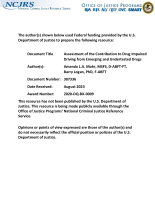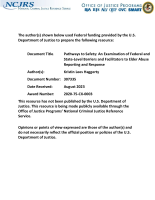Text
Pathways to Safety: An Examination of Federal and State-Level Barriers and Facilitators to Elder Abuse Reporting and Response
The Emerging Field of Firearms Audio Forensics
Integrating Large Datasets in Outcome Research: A Case Example
A tool for simulating single source and mixed DNA profiles
Relations Between Parental Attachment, Empathy, and Bystander Help-Seeking Preference Following Peer Aggression
Adolescent Emotion Regulation and Future Psychopathology: A Prospective Transdiagnostic Analysis
Effects of building demolitions on firearm violence in Detroit, Michigan
US Mass public shootings since Columbine: victims per incident by race and ethnicity of the perpetrator
Out-of-home placement, sleep problems, and later mental health and crime: A prospective investigation
Immigration and School Threat?: Exploring the Significance of the Border
A method for the development of cranial fracture histology slides
SEL in Context: School Mobility and Social-Emotional Learning Trajectories in a Low-Income, Urban School District
Intimate Partner Violence and Family Dispute Resolution: 1-Year Follow-Up Findings From a Randomized Controlled Trial Comparing Shuttle Mediation, Videoconferencing Mediation, and Litigation
Improving or declining: What are the consequences for changes in local crime?
School Safety or School Criminalization? The Typical day of A School Resource Officer in the United States
A Multisite Evaluation of Prosecutor-Led Pretrial Diversion: Effects on Conviction, Incarceration, and Recidivism
Digital Transformation of Cold Case Reviews: Prevalence, Challenges, and Benefits of Just Resolutions
Digital Transformation of Cold Case Reviews: Digitizing Case Files
Digital Transformation of Cold Case Reviews: The Application of Text Analytics
Embedding Biometric Identifiers in 2D Barcodes for Improved Security
Evaluation of Technology-based Advocacy Services (ETA): Technical Report, Executive Summary
Recognizing Radicalization Indicators in Text Documents Using Human-in-the-Loop Information Extraction and NLP Techniques
Learning from Doing Evaluating the Effectiveness of the Second Chance Act Grant Program
Reauthorized in 2018, the Second Chance Act (SCA) aims to reduce recidivism and improve outcomes for people returning from state and federal prisons, local jails, and juvenile facilities through the provision of federal grants. During this panel, National Institute of Justice-funded researchers will detail two ongoing evaluations of the SCA grant program:
- An evaluation of the effectiveness of the SCA grant program per Title V of the First Step Act.
- A longitudinal examination of the long-term impacts of the SCA program.
See the YouTube Terms of Service and Google Privacy Policy





